At Graylaw Practice LP, we are committed to providing valuable legal insights to both our clients and the public. In this post, we focus on an essential topic in Nigerian law: The Concept of Bail. For an in-depth understanding, be sure to watch our detailed YouTube video on this subject, presented by Barr. Nnenna Okereke.
What is Bail?
Bail is a crucial aspect of the Nigerian criminal justice system. It involves the temporary release of a person who has been accused of a crime while they await trial, under specific conditions. This process allows individuals who are presumed innocent until proven guilty to remain free under certain conditions.
Bail is governed by the Administration of Criminal Justice Act 2015 for federal offences, and various state laws for state-level offences. Barr. Nnenna Okereke goes into detail on how the Nigerian legal system handles bail in our latest YouTube video.
WATCH THE VIDEO NOW to explore how the grant of bail and its administration work in Nigeria.
Prepared by: Edward Omaga
Channel: LAW AND THE PEOPLE – A Graylaw Practice LP Initiative
This report outlines the constitutional process for the impeachment of a State Governor in Nigeria, as explained in a recent episode of LAW AND THE PEOPLE, a YouTube initiative by Graylaw Practice LP. The episode, hosted by Edward Omaga, aims to provide a quick, clear, and legally accurate breakdown of what it takes to remove a sitting Governor from office under Nigerian law.
2. Constitutional Basis
The legal framework for impeaching a State Governor is provided under Section 188 of the 1999 Constitution of the Federal Republic of Nigeria (as amended). A Governor can only be removed from office for gross misconduct, and this must follow a structured, multi-step process that ensures fairness and adherence to due process.
3. Step-by-Step Breakdown of the Impeachment Process
Step 1: The Allegation
-
A written allegation of gross misconduct must be presented to the Speaker of the State House of Assembly.
-
It must be signed by at least one-third of the House members.
Step 2: Notice to the Governor
-
The Speaker must serve a copy of the allegation to the Governor within 7 days.
Step 3: Governor’s Right of Reply
-
The Governor is entitled to reply in writing.
-
His response must be circulated to all members of the House.
Step 4: Motion for Investigation
-
Within 14 days, the House must vote (without debate) on whether the allegation warrants investigation.
-
Two-thirds majority support is required for the motion to pass.
Step 5: Formation of Investigative Panel
-
Upon approval, the Speaker requests the Chief Judge of the State to set up a 7-member panel.
-
Panel members must be non-partisan and of unquestionable integrity.
Step 6: Panel Investigation
-
Per Section 188(5)-(6), the panel has up to 3 months to investigate.
-
The Governor has the right to defend himself in person or through a legal representative.
Step 7: Panel Report and House Resolution
-
As outlined in Section 188(7), if the panel finds the allegations unsubstantiated, the process ends.
-
If substantiated, the House reviews the panel’s findings and proceeds to the next vote.
Step 8: Final Impeachment Vote
-
Under Section 188(9), the House must vote again.
-
If two-thirds of all members support the panel’s report, the Governor is impeached.
-
The Deputy Governor is immediately sworn in as the new Governor.
The impeachment process is a serious constitutional mechanism designed with checks and balances to protect democratic governance. It ensures that Governors can be held accountable, but also shields them from politically motivated removals by enforcing a strict procedural framework.
Read also: REPORT ON THE LAUNCH OF “LAW AND THE PEOPLE” YOUTUBE CHANNEL
This episode of LAW AND THE PEOPLE is part of our ongoing effort to educate citizens on legal matters that affect them directly. Understanding these processes is key to citizen participation, accountability, and good governance.
Prepared by: Uchenna Mojekwu
Position: Head of Branding and ICT, Graylaw Practice LP
1. Introduction
Graylaw Practice LP is proud to announce the launch of its official YouTube Channel titled “LAW AND THE PEOPLE” — an initiative aimed at demystifying the law and making legal knowledge accessible to all. The platform is part of the firm’s corporate social responsibility to bridge the gap between legal principles and everyday life.
2. Purpose and Vision
The core objective of LAW AND THE PEOPLE is to empower the general public with accurate, practical, and easily understandable legal information. In a time when legal issues increasingly intersect with daily living, it has become imperative that individuals and businesses understand their rights, obligations, and opportunities under the law.
This initiative aligns with Graylaw Practice LP’s tradition of giving back to society through education, outreach, and charity.
3. Content Strategy
The YouTube channel will feature diverse content categories, including:
-
Legal Insights: Expert commentary on emerging legal trends and landmark rulings.
-
Practical Guides: Step-by-step explanations of legal processes and procedures.
-
Public Interest Topics: Analysis of everyday legal issues affecting businesses, professionals, and the average citizen.
-
Q&A Sessions: Opportunities for the public to ask questions and receive general legal guidance.
4. Target Audience
The channel is designed for:
-
Business owners
-
Working professionals
-
Students
-
Aspiring entrepreneurs
-
The general public interested in understanding the law
5. Expected Outcomes
By engaging with this platform, viewers will:
-
Gain critical awareness of their rights and responsibilities
-
Make informed decisions in personal and business matters
-
Avoid common legal pitfalls
-
Build confidence in navigating legal environments
6. Call to Action
Viewers are encouraged to:
-
Subscribe to the channel
-
Turn on notification alerts
-
Share the videos across social media platforms
-
Participate in upcoming interactive sessions
7. Conclusion
With the launch of LAW AND THE PEOPLE, Graylaw Practice LP reinforces its commitment to using its legal expertise as a tool for public enlightenment and social impact. This is not just a channel — it is a community-driven effort to build a more legally aware and empowered society.
Graylaw Practice LP commends the recent appointment of Hon. Justice Theophilus Nnamdi Nzeukwu as the Acting Chief Judge of Imo State, an appointment widely endorsed by leading voices in the Imo State legal community. The support from notary publics under the aegis of the Imo State Lawyers Forum underscores a strong consensus within the Bar that merit and judicial excellence must remain the cornerstone of judicial appointments.
Governor Hope Uzodinma’s appointment of Justice Nzeukwu on April 2, 2025, followed the recommendations of the Imo State Judicial Service Commission and the National Judicial Council (NJC). The appointment came in the wake of the removal of former Chief Judge, Hon. Justice T.E.C. Chikeka, over allegations of age falsification.
In a joint press statement issued in Abuja, a coalition of legal professionals described Justice Nzeukwu as “the most qualified Judge of the Imo State High Court” at the time of his appointment. According to the statement, opposition to his confirmation as substantive Chief Judge is being driven by “Bar politicians” prioritizing seniority over merit.
“Justice Nzeukwu is an incorruptible Judge, and all lawyers and litigants in Imo State can attest to his integrity, uprightness, forthrightness and humility. His appointment indeed is divinely orchestrated,” the statement read.
Read Also: Graylaw Practice LP: Legal Expertise in Nigerian Capital Market Operations
Titled “Endorsement of the Appointment of Hon. Justice T. N. Nzeukwu as the Acting Chief Judge of Imo State by His Excellency Sen. Hope Uzodinma, CON, GSSRS and Unanimous Support for His Confirmation as the Substantive Chief Judge of Imo State,” the endorsement was signed by prominent members of the Forum including John O. Eboh, Kelechi K. Ezeribe, Sylvester C. N. Wobi, and others.
The Forum emphasized that their support is rooted in the qualities they believe Justice Nzeukwu brings to the judiciary—competence, impartiality, and a reputation for incorruptibility. They noted that prior to the appointment, there had been growing concern over the leadership vacuum in the state’s judiciary, which risked affecting the administration of justice.
“As a posse of legal practitioners that place great deal of premium on competence and capacity in judicial appointments, we are prodigiously elated that the executive Governor of Imo State, in the exercise of his prerogative under Section 271(4) of the 1999 Constitution (as amended), prioritized competence and legal dexterity—which Hon. Justice T. N. Nzeukwu epitomizes.”
At Graylaw Practice LP, we uphold the principle that the judiciary must be led by men and women of unquestionable integrity and capacity. We believe that the endorsement by the Imo State Lawyers Forum is a commendable act of courage and commitment to judicial excellence. As the legal profession continues to navigate the intersection of law and governance, we align with voices calling for reforms anchored on merit, fairness, and the rule of law.
Justice Nzeukwu’s appointment is not just a legal decision—it is a declaration that the Imo State judiciary deserves the very best.





